
 Here’s what you get in 42nd Street Forever, Synapse Films’ first in a series of trailer compilations: flesh, blood, women, terror, an undertaker, his pals, nude nuns, killer ‘shrooms, crippled masters, centerfold girls, chicks with dicks, werewolves on wheels, pink angels, creampuffs, a post-apocalyptic decapitation and much, much more. As the clip for Starcrash warns, “You are about to be HURLED …”
Here’s what you get in 42nd Street Forever, Synapse Films’ first in a series of trailer compilations: flesh, blood, women, terror, an undertaker, his pals, nude nuns, killer ‘shrooms, crippled masters, centerfold girls, chicks with dicks, werewolves on wheels, pink angels, creampuffs, a post-apocalyptic decapitation and much, much more. As the clip for Starcrash warns, “You are about to be HURLED …”
In the mondo movie Secret Africa, a narrator intones almost gleefully, “A baby girl is scarred … for beauty!” Uniquely, a double feature of The Blood Spattered Bride and I Dismember Mama is presented as a faux news report, complete with mention of the “Up Chuck Cup” gimmick. Confessions of a Summer Camp Counselor is one of those colorful sex comedies from the UK that the book Keeping the British End Up: Four Decades of Saucy Cinema rendered with such infectious nostalgia. Wicked, Wicked pits Tiffany Bolling against a slasher in a hotel employee uniform, in a little somethin’ called “anamorphic Duovision”: “Twice the action! Twice the excitement!”
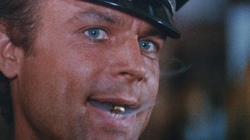 This debut volume is heavy on the lost art of ’70s porn trailers, which make adult films like The 3Dimensions of Greta look (almost) downright respectable. Another 3-D one is Hard Candy, starring The Lollipop Girls and John Holmes, who tells (warns?) viewers that they “can now sit under the shadow of my long schlong.” Panorama Blue touts being “shot in 70mm super widescreen/Panoramascope” while a couple makes out on a moving roller coaster, stripping until they’re fully nude. Don’t forget The Italian Stallion, starring a pre-Rocky Sylvester Stallone as Stud; all they can show here is Sly romping in the snow and playing on a jungle gym. (That’s not a euphemism.)
This debut volume is heavy on the lost art of ’70s porn trailers, which make adult films like The 3Dimensions of Greta look (almost) downright respectable. Another 3-D one is Hard Candy, starring The Lollipop Girls and John Holmes, who tells (warns?) viewers that they “can now sit under the shadow of my long schlong.” Panorama Blue touts being “shot in 70mm super widescreen/Panoramascope” while a couple makes out on a moving roller coaster, stripping until they’re fully nude. Don’t forget The Italian Stallion, starring a pre-Rocky Sylvester Stallone as Stud; all they can show here is Sly romping in the snow and playing on a jungle gym. (That’s not a euphemism.)
More names can be found in Corruption, with Peter Cushing as a ladykiller (the illegal kind); Ginger, starring Cheri Caffaro as the titular “goddamn dick-teasing bitch”; Super Fuzz with Terence Hill as the super cop who sees red; and Destroy All Monsters with Godzilla and the whole damn gang. Destroy all your plans for the next two hours and eight minutes when you slide this disc into your player. —Rod Lott


 Why is it that most triptych flicks seem to place the weakest segment in the middle? Such is the case with “Merde.” From Leos Carax (
Why is it that most triptych flicks seem to place the weakest segment in the middle? Such is the case with “Merde.” From Leos Carax (
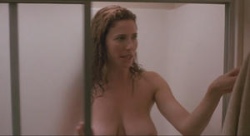 Unable to kill herself, she is saved from imprisonment by the titular event, only to face the near-impossible choice of loving the deity who caused her so much pain or spending the rest of eternity in desolate isolation.
Unable to kill herself, she is saved from imprisonment by the titular event, only to face the near-impossible choice of loving the deity who caused her so much pain or spending the rest of eternity in desolate isolation.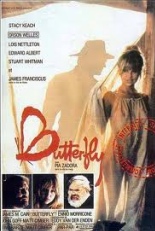
 Orson Welles shows up as a drunken judge and bloats all over the screen, delivering a wonderfully unintelligible performance that is so bitter and careless and drunk on Paul Masson, I doubt he knew the cameras were rolling. But maybe that’s just Matt Cimber’s charmingly free-flowing directorial style which, coincidentally, made him the Razzies’ pick for worst director that year. (That’s okay, Matt, the Razzies have been the stupidest award show since … well, ever. Consider the source.)
Orson Welles shows up as a drunken judge and bloats all over the screen, delivering a wonderfully unintelligible performance that is so bitter and careless and drunk on Paul Masson, I doubt he knew the cameras were rolling. But maybe that’s just Matt Cimber’s charmingly free-flowing directorial style which, coincidentally, made him the Razzies’ pick for worst director that year. (That’s okay, Matt, the Razzies have been the stupidest award show since … well, ever. Consider the source.)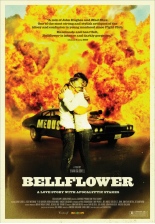
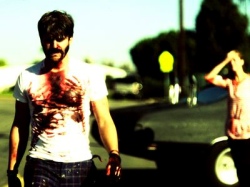 Then Woodrow meets Milly (Jessie Wiseman) during a cricket-eating contest in a bar, and the two hatch an instant relationship. What occurs after the meet-cute is where Bellflower gets really engrossing … and details of which I can’t share, lest the moments be spoiled. I can say that moods are flipped like someone with an unmedicated diagnosis of bipolar, that Woodrow’s very existence is shaken to its foundation, that things unfold in a manner incongruent to predictable movie plots, that Bellflower grows considerably weird and wild and even unsettling.
Then Woodrow meets Milly (Jessie Wiseman) during a cricket-eating contest in a bar, and the two hatch an instant relationship. What occurs after the meet-cute is where Bellflower gets really engrossing … and details of which I can’t share, lest the moments be spoiled. I can say that moods are flipped like someone with an unmedicated diagnosis of bipolar, that Woodrow’s very existence is shaken to its foundation, that things unfold in a manner incongruent to predictable movie plots, that Bellflower grows considerably weird and wild and even unsettling.